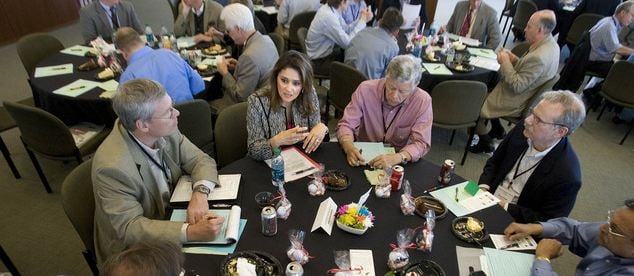We've heard for a while now about the aggressive, determined way Utah is working to grow its biotech economy, particularly through advancing university research and commercializing the technology that comes out of it. Since getting private capital interested in university science invention is a major step in making that commercialization happen, the University of Utah Technology Commercialization Office (TCO) has come up with an innovative arena for matching inventors with backers, and it looks a lot like...speed dating. They call it science "speed teching," and the first University Innovators Speed Teching Showcase event took place May 22nd in a large conference room at Salt Lake City's Zions Bank.
[Photo courtesy of the Salt Lake Tribune]
16 inventors (or their representatives) from three Utah universities and 50 investors participated in the rapid-pace event. The venture capitalists sat at round tables and ate lunch. Each startup innovator had 90 seconds to sit down with them and present the company's research and business goals. One and half minutes to concisely convey the gist of your product, its significance, and your commercialization plans. It isn't time for much in the way of details, but investors said they heard enough to know which proposals they would likely follow up on.
According to Bryan Ritchie, director of University of Utah's TCO:
“Matching technologies with investors is a lot like dating. You never know how it will begin, you never know how it will develop, and sometimes it stops with no explanation whatsoever. It’s funny to think of it this way, but it’s also very serious. New ideas require innovative input and direction to move them forward, and that’s exactly what we’re doing.”
One presenter, Beth Drees of the University of Utah, had this to say of the experience:
"I wish I had a little more time, but it wasn’t nerve-racking. You want to get them interested and hope they come to you afterward. It’s very energizing, and it keeps you moving."
Drees is Senior Business Development and Technology Manager at the TCO. Similarly, the woman presenting a proposal to the group in the photo above is Moj Eram, Technology Licensing Manager at the TCO. That should give you some idea of how involved the University of Utah Tech Commercialization Office is in marketing the research coming out of the University's labs. In fact, many startups are formed by the TCO itself, to create an entity that is fundable through an SBIR grant or angel funding, without the researcher having to give up his or her academic position to run the nascent company until it has legs under it.
Ritchie and his colleagues considered the event a success and plan to hold it twice-yearly from now on. They see it as a critical tool in advancing technologies from research laboratories to the real world. Faculty members at the Univ of Utah, for example, disclose more than 200 inventions every year, but only a fraction of those technologies are being licensed to startups or established companies.
That said, the University of Utah still has one of the highest tech transfer rates in the country. For the second year in a row, the U of U was ranked #1 for the number of new startups based on university research, according to an annual survey by the Association of University Technology Managers.
Another new avenue the TCO is exploring to boost their successful transfer rate is simplifying the licensing procedure for some technologies, with what they call the “value express license agreement.” Simpler and cheaper than standard agreements, there are no upfront fees, they are not exclusive, and there is a standard format that can be executed on the spot. At a time when funding is tight, spending years in negotiations over terms simply puts too many technologies out of reach. Ritchie says:
“Our new licensing agreement is designed to put as many of our technologies to use as possible. We have a group of technologies that have high potential but haven’t been licensed as quickly as we would like. These new licenses are designed to attract more investors by removing most of the risk and expense.”
For more on the economic impact of technology commercialization in Utah, watch this video from the U of U's Technology Venture Development (aka TCO) website:
Biotechnology Calendar, Inc. will be on the University of Utah campus this September. If you are a biomedical researcher, a scientist in any of the life science fields, or a supplier of laboratory equipment who would like the opportunity to meet and network with biotechnology research professionals in the Salt Lake City area, plan on attending our Utah Front Line Event™ on the University of Utah campus on September 20, 2012.
For more information on exhibiting and getting a U of U funding report, click the button:



